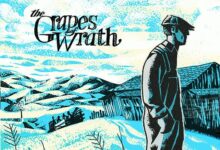Orwell’s book concludes with a pessimistic view, and I’ve never understood why most people ignore it.
My view of 1984 is that it is an extremely pessimistic work, the kind of despairing pessimism like hunger, cold, or physical pain. With indifference, you think you can grit your teeth and persevere, but the result is only to repeatedly prove your weakness.
Creating that pessimistic despair is not other than human nature itself – politics is an extension of human nature, and the political system is the setup of our way of life. It is the human beings for their own lives, the destiny of future generations, and the future of a handful of yellow earth or withered bones to retain the ideals and hopes. The social system and lifestyle that Orwell envisioned in his book didn’t scare me; what scared me was the cause of that lifestyle – “Torture for the sake of torture, power for the sake of power.”
So, I think Orwell’s observation of human nature is much more poignant and brilliant than his observation of the political system. His portrayal of human nature in the book proves to be even more valuable – the articulation of sexuality as a form of political revolt, the unquenchable passion or fear that desire has for life, and the love of life that comes from the human heart: “He is a man who has a deep and abiding love of life,” he says, “and he is a man who has a deep and abiding love of life. love of life: “He looked at the quiet, sleeping naked body beside him and suddenly felt a desire to embrace and protect her.”

I have an abiding fear: if sex is to be robbed of the joy of life and become a nervously loathsome means of procreation, if a man is to be robbed of his sensibility to everything around him and become a fervent appendage to a single faith; if life is just a process of earning a living, of being fed, and of reproducing, and does not contain any creative mental recreation. But Orwell didn’t think it was enough, saying that even the instincts of human emotion can be stripped away and that you will betray your love out of hatred and fear.
This was the part of 1984 I read the most—the torture of Winston Smith, “You must not only obey, you must love from the heart”—and I was like Melanie, the protagonist of The Maiden and the Dead, fascinated by the last moments of the people who die in their torment. Winston didn’t die; he sat like the walking dead in a café, drinking gin full of oil, “Under that big banyan tree, I betrayed you. You betrayed me.”
“When I was in the moment of betraying you, I knew that it would never feel the same again.” To save our own lives, out of fear of harm, we will betray anyone, their lives, their souls, and even our instincts as human beings. Again, I feel the despair in Orwell’s writing, the despair of man degrading into an animal. No, we are not even as good as animals, like the proletarians, “whose life is to survive, to reproduce, to go through life day by day,” but “they have no beliefs whatsoever, and they are only loyal to each other and their loved ones Loyalty.” So “the proletarians are human, we are not human.”
I think Orwell meant that whether it is the top of society who are fanatical about power or the bottom of society who are ignorant about life, they are all human beings living in simple faith. At the same time, the middle class, i.e., the intellectuals, are not human beings because we are educated and seek the truth but are powerless in the face of simple fanaticism, whether it be power or mediocrity. Therein lies the significance of the notion of “doublethink”: the mind of the intellectual is the part of the brain that needs to be stifled the most, and the independently minded are the most dangerous criminals for domination. Moreover, it can be transformed and stifled. Without believing in truth and knowledge, intellectuals completely lose their value as human beings, and even their emotions and desires can be deprived of them.

1984 may be a political prophecy, but I prefer to see it as an allegory of fate – the most important social responsibility of intellectuals is to ensure that we live in a world that is not set free to choose. 100 years ago, Russell said that participating in this colorful is the source of life. I like to engage in creative work, love the people I love, and do not betray them because of the will of any other person.1984’s greatest value lies in the fact that he is a prompter of despair to every intellectual in the world, reminding us that whenever someone wants to organize our lives and control our thoughts, we should not hesitate to ask aloud, in an ontological tone of voice, “Who is he, where does he come from, and what does he want? What does he want?

 Essays on CLassic
Essays on CLassic


